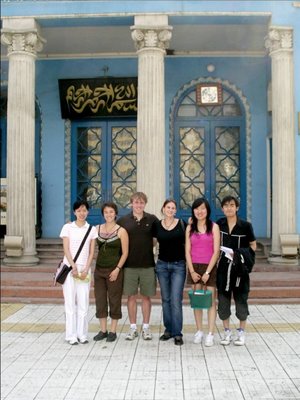Wasted Time
This is it. It's the day of the final in that big scary math class you've been going to every day this semester. You're nervous, but confident because you've studied all the material presented in class, gone over and over the homework problems, attended the study groups and know the lecture notes by heart. You even read a few sections out of the textbook.
If you were in America, I'd say you were a shoe-in for an A. Heck, with that kind of preparation overkill, you'd have a chance at the big 100% if you don't make any silly mistakes. Too bad this is China, where at least 60% of the material on the test will be above the level of anything covered in class or assigned in the homework. You should have taken note of the other students study habits, like reading more advanced sections of the textbook and getting ahold of extra practice books with more difficult problems. The textbooks just don't make 'em hard enough to meet the testing standards here. You also probably shouldn't have watched those Walker, Texas Ranger re-runs or gone exercising in your spare time. If you really wanted to do well, you should have restricted yourself to sleeping 4 hours a day and bought some tylenol to handle the back pain from studying the other 2o.
Welcome to China's high school's and colleges, where study habits and material covered are driven solely by tests and the need to distinguish the brightest and most diligent students from the rest of the pack. What's that? You say that you'll never need to take limits involving both arccos and the natural logarithm again in your life? Ah, but you forget...practicality and applicability aren't even considered here. If all the material were practical and applicable, every student would have be acing every test. Every student would be the same; there'd be no way to tell who to admit colleges, grad schools, and the big fish: a pass into a cushy American university where A's grow on trees if you study like you did in China.
The problem is supply and demand. The demand for a spot in a decent university is huge; take a look at the population. The spots available are not so numerous. Therefore, the price of one of these spots increases. The price is not measured in money, but time. Time not spent sleeping. Time not spent playing soccer, zoning out, going to the lake, riding your bike, reading a book...whatever. It's all spent studying. I'm a little wierd because I don't mind studying. Usually I feel like I'm learning something I might be able to use later. The other times, I grit my teeth and just do it. In China, there's a lot more teeth grinding going on, a lot more than I'd put up with. Practically speaking, nearly every test problem is unnecessarily complicated. That's not to say you'd never need to do it, just that there's no need to be able to do every single type of brain-melting problem there is.
For example: Say there are 50 kinds of very difficult math problems, the worst of the worst, the kind we don't ever have to worry about in American schools. In order to do well on the Chinese math final, the Chinese student had better know how to do every kind of problem. Say it takes 1 hour for each kind of problem; that's 50 hours studying. I, the American student, don' t do any of this studying; that's 0 hours.
These problems aren't useless. They do solve real world questions. Say I and this Chinese student get work as electrical engineers at the same place, same job. We might have to know how to solve 2 of those kinds of really tough problems. So when I first get this job, I'll be a little behind the Chinese guy. I spend those 2 hours to master the 2 kinds of problems I need to know. That means that practically speaking, the Chinese guy wasted 48 hours of his life.
It's too bad there's so much waste going on. It seems like there must be a better way. Of course the Chinese students realize their situation, but they have no alternative. If they're not willing to put in the 50 hours, then the next guy is, and he'll get the job because his test score was higher. It doesn't matter that in the end there's no difference between the two workers.
Maybe this is the solution: Reduce the test level down to where it is in America. Then, take all the 100%'s and just have a lottery to determine who gets what school. Seems like a good communist method, and if you ask me, China's too confusing right now. It says it's communist, acts capitalist, then the government just does whatever it wants. Better to just go all out one way or the other. At least that would take some of the pressure off the poor kids being forced to study their lives away.
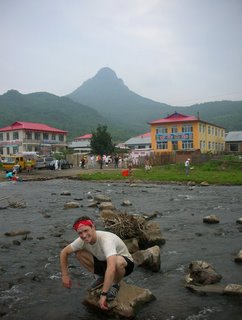

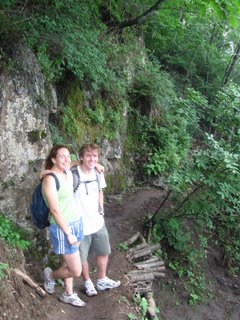
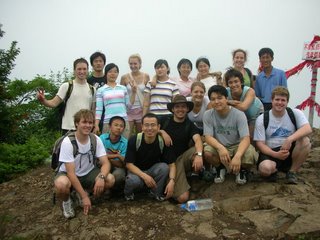
 I just spent a few minutes trying to come up with a clever caption for these signs but failed...I guess they speak for themselves. I brought my frisbee to the park because I thought there might be a place for it but actually it wasn't that kind of park. I haven't seen a decent grass playing field since I've been here.
I just spent a few minutes trying to come up with a clever caption for these signs but failed...I guess they speak for themselves. I brought my frisbee to the park because I thought there might be a place for it but actually it wasn't that kind of park. I haven't seen a decent grass playing field since I've been here.
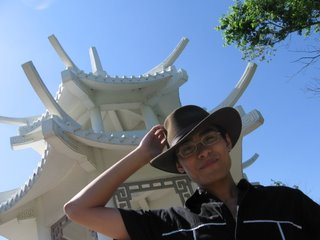
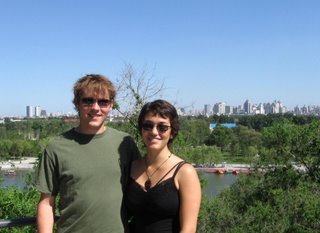
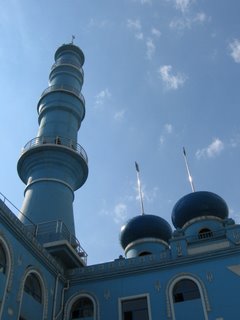 This is a more interesting view of the mosque in the last post. I should qualify by saying that I think it's a mosque, but I'm not entirely sure what the Chinese word for mosque is...imagine playing charades and drawing "muslim mosque"...
This is a more interesting view of the mosque in the last post. I should qualify by saying that I think it's a mosque, but I'm not entirely sure what the Chinese word for mosque is...imagine playing charades and drawing "muslim mosque"...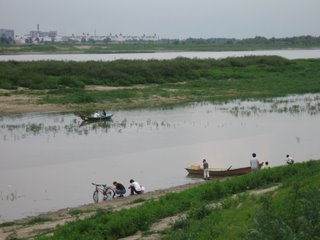 This picture was taken from the spot I was talking about on the Song Hua River...this is the view of the normal people enjoying thier benzene filled river, but the other direction has all kinds of tourist-driven activities.
This picture was taken from the spot I was talking about on the Song Hua River...this is the view of the normal people enjoying thier benzene filled river, but the other direction has all kinds of tourist-driven activities. 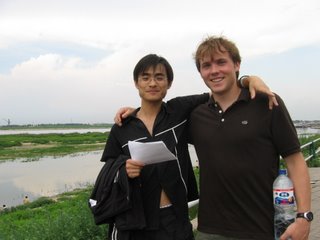 And here I am at the riverside with my good old roommate Ren Feng, ever charismatic and often incomprehensible, at least for now.
And here I am at the riverside with my good old roommate Ren Feng, ever charismatic and often incomprehensible, at least for now.